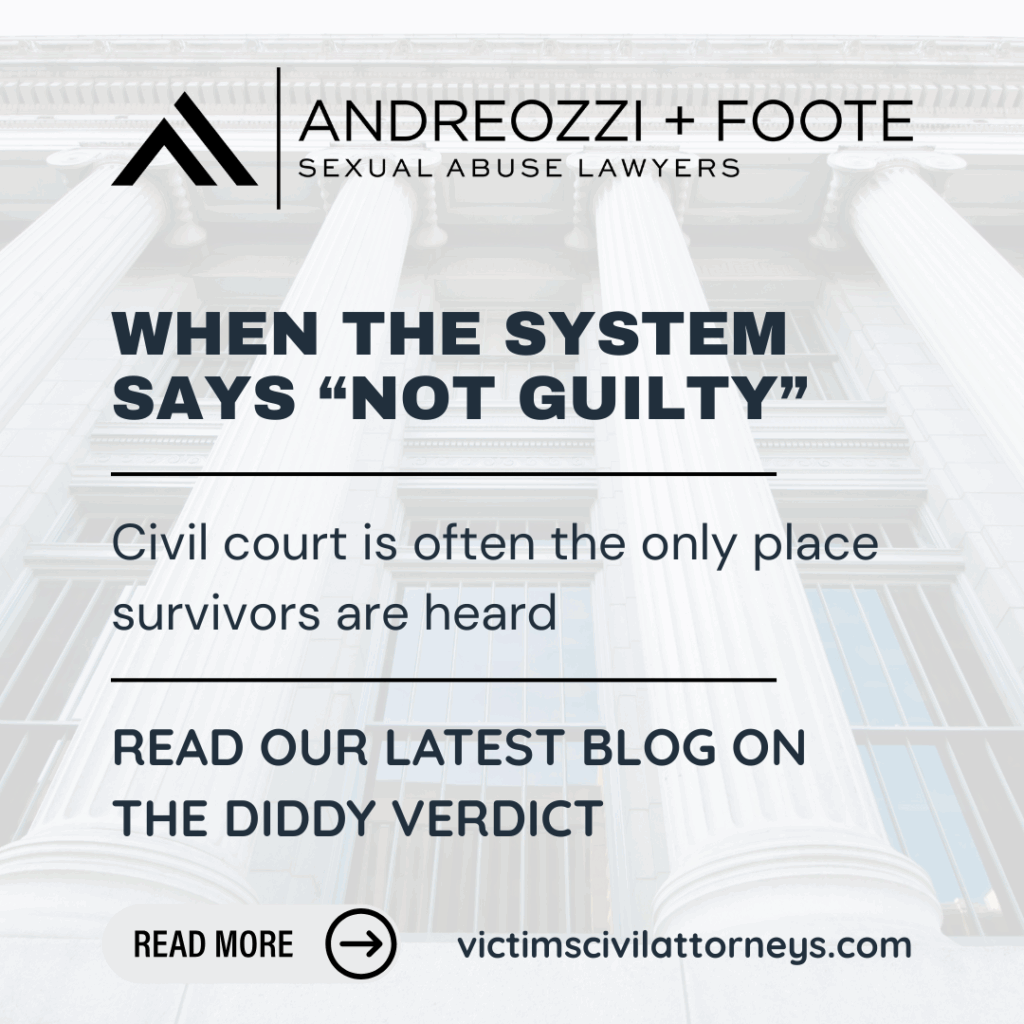When the headlines dropped about P. Diddy and the explosive allegations of sex trafficking, rape, and abuse, the world was shocked—at least momentarily. But for survivors and those of us who stand with them, the news about P. Diddy was not a revelation. It was confirmation of what we’ve always known: those with wealth and power can violate, degrade, and exploit others—and often walk away without consequence.
Let’s be very clear: The criminal justice system has failed these women. Despite graphic, corroborated allegations and a civil settlement that speaks volumes. And yet, P. Diddy was found not guilty of federal sex trafficking and racketeering after an intense federal criminal trial. A Manhattan jury acquitted him on the two trafficking counts and the racketeering conspiracy charge—while convicting him only on two lesser prostitution-related offenses.
But let’s be clear: This outcome isn’t a clean exoneration—it’s a reflection of our system’s deep flaws and the challenges survivors face pursuing justice.
A System Built to Protect the Powerful Like P. Diddy
During weeks of shocking testimony in the P. Diddy trial, survivors shared stories of drug-facilitated assaults, emotional control techniques, exploitation at so-called “freak-off” parties, and physical violence—including a disturbing recorded assault on Cassie Ventura. Still, the jury found Combs not guilty of trafficking and racketeering. The trial showed a clear pattern of trafficking, exploitation, and intimidation. Federal agents raided Combs’ homes. Civil settlements were reached.
Why Juries Struggle to Convict in Sex Trafficking Cases Like P. Diddy
Sex trafficking isn’t just a crime—it’s a systemic epidemic, deeply misunderstood and frequently dismissed by the legal system.
According to the U.S. Department of Justice and National Human Trafficking Hotline:
- Only 1% of human trafficking cases result in a conviction
- Survivors are often blamed, discredited, or disbelieved, especially if they were coerced into substance use or had a history of abuse
- Jurors often carry harmful myths:
“Why didn’t she leave?”
“She must have agreed to it.”
“She was just trying to get money or fame.”
These biases echo the same dismissals survivors of domestic violence have heard for decades. Survivors are asked to behave like perfect victims, tell their stories in neat timelines, and remain calm while recounting the worst moments of their lives. But trauma doesn’t work that way. And justice rarely follows a clean path.
1. The Burden of Proving Coercion
Sex trafficking in federal court requires proof of “force, fraud, or coercion.” As one former prosecutor put it, even compelling testimony can fall short when jurors must believe that force elementnypost.com+15people.com+15cbsnews.com+15.
2. Juror Bias & Trauma Ignorance
Jurors carry myths: “Why didn’t she leave?” “Was it consensual?” These questions—often unfair—drive doubt, especially in cases involving powerful defendants .
3. Celebrity & Power Protect Privilege
High-profile defendants can shape narratives, intimidate witnesses, or create confusion through public influence—leaving juries hesitant to find them guilty.
Why Civil Lawsuits Matter: They Are Not “Money Grabs”—They Are Survival
When people ask, “Why didn’t she go to the police?” or “Why sue for money?”, they ignore the very real truth that for many survivors—especially those abused by powerful men—civil court is the only courtroom where they are heard.
Civil lawsuits:
- Bypass the prosecutorial gatekeepers who often refuse to bring charges
- Allow survivors to control their narrative, rather than be cross-examined into silence
- Force accountability through financial penalties, public exposure, and institutional change
And let’s be honest: criminal trials can retraumatize survivors and still end in acquittal, especially when wealth and influence are involved. Civil court is not second best—it is often the only path to justice.
What The P. Diddy Case Teaches Us
The P. Diddy case is not about celebrity scandal—it’s about what our society is willing to tolerate when the abuser is rich, famous, and male. It’s about how we still struggle to believe survivors. How we treat abuse behind closed doors as a private matter unless a body turns up.
And, it’s why we do this work at Andreozzi + Foote. Because we know survivors cannot always rely on prosecutors, police, or juries. We know that justice often comes in the form of a civil suit—not because survivors want money, but because they deserve truth, accountability, and a path forward.
You Deserve Justice—No Matter Who Harmed You
We know the P. Diddy verdict is a slam in the face to survivors. If you are a survivor of sexual abuse, trafficking, or exploitation, you are not alone, and you are not without options. Civil justice may be your path. We are here to help you walk it.
Contact us today for a free, confidential consultation:
Visit: www.victimscivilattorneys.com
Call: 866-753-5458
We will listen. We will believe you. And we will fight for you—no matter how powerful the person who harmed you is.



